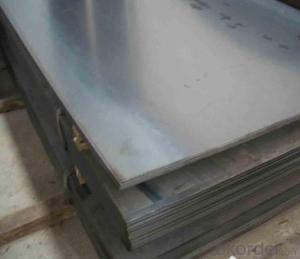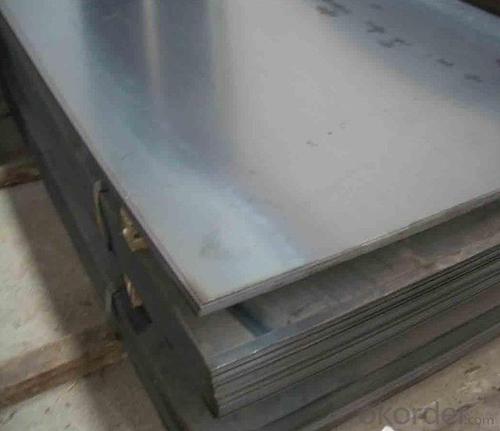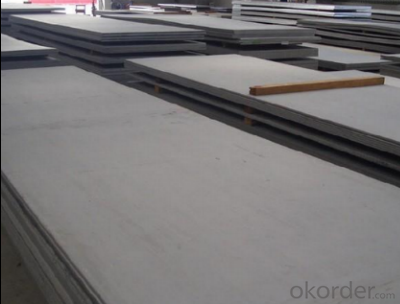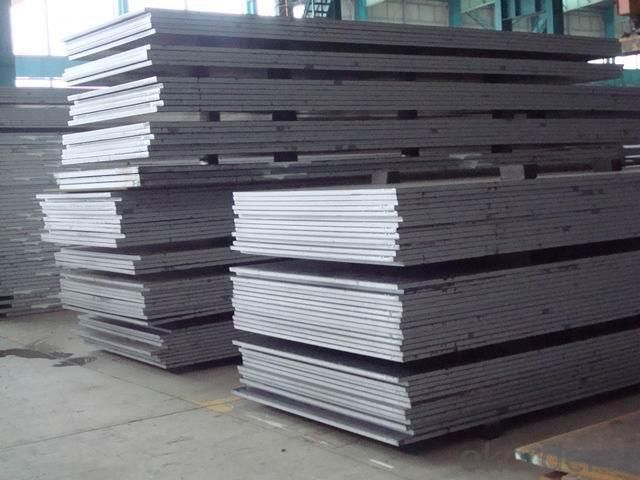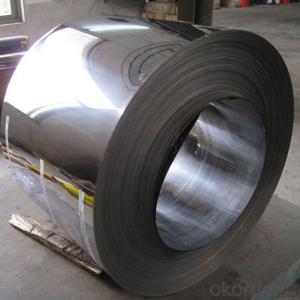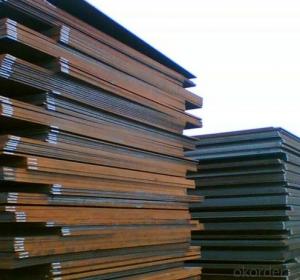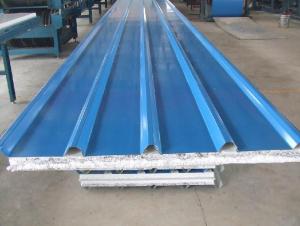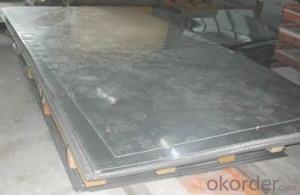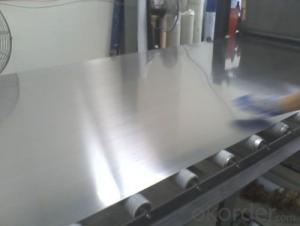High-strength Wear Plate
- Loading Port:
- China Main Port
- Payment Terms:
- TT OR LC
- Min Order Qty:
- -
- Supply Capability:
- -
OKorder Service Pledge
OKorder Financial Service
You Might Also Like
GRADE:GB/T24186 or according to customer's requirements
ADVANTAGE:Steel surfacehardnessuniformity,goodcutting and weldingproperties,roughness less than 6mm/m
Application:Formining machinery,heavy truckscars,concrete mixingequipment
According to the characteristics of the steel group is divided into five categories: austenitic size, austenitic grain size, iron-iron grain size, shape, markov precipitation sclerosis type.
Requests can withstand oxalic acid, sulfuric acid, nitric acid, nitric acid-ferric sulfate-hydrofluoric acid, sulfuric acid, phosphoric acid, formic acid, copper sulfate, acetic acid, etc. Various kinds of acid corrosion, widely used in chemical industry, food, medicine, paper making, oil, atomic energy industry etc, as well as the construction, kitchen utensils, tableware, vehicles of all kinds of parts, household appliances.
In order to ensure that each kind of stainless steel plate of the yield strength, tensile strength, elongation and hardness of mechanics performance accords with a requirement, steel plate must pass before delivery annealing, solid solution treatment, aging treatment of heat treatment, etc.
Stainless steel plate [1] the surface is bright and clean, have a high plasticity and toughness and mechanical strength, acid and alkaline gas and other media, the solution of the corrosion. It is not an easy to rust of alloy, but not absolutely doesn't rust.
Stainless steel corrosion depends primarily on its alloy composition (chrome, nickel, titanium, silicon, aluminum, etc) and internal organizational structure, plays a main role is chrome elements. Chrome has the very high chemical stability, can in the steel surface passivation membrane formation, the metal and isolated, protect steel plate were not oxidation, enhance the steel corrosion resistance. Passivation membrane destruction, the corrosion resistance will decline.
- Q: What are the different profile options available for steel sheets?
- There are several different profile options available for steel sheets, each serving different purposes and offering unique benefits. Some of the most common profile options include: 1. Plain Sheet: This is the simplest and most basic profile option, with a flat surface and no additional features. It is commonly used for general purposes where aesthetics are not a priority. 2. Corrugated Sheet: Corrugated steel sheets have a series of parallel ridges and grooves, creating a wavy pattern. This profile provides extra strength and rigidity, making it ideal for roofing, cladding, and fencing applications. The ridges also enhance water shedding, preventing water accumulation on the surface. 3. Ribbed Sheet: Ribbed steel sheets have a series of raised parallel ridges or ribs running along the length of the sheet. This profile offers improved strength and load-bearing capacity, making it suitable for applications that require structural integrity, such as mezzanine floors, decking, and industrial flooring. 4. Perforated Sheet: Perforated steel sheets have a pattern of holes punched into them, allowing for ventilation, light transmission, and drainage. This profile is commonly used in architectural designs, façades, acoustics, and filtration systems. 5. Tread Plate: Tread plates have a raised pattern of lines or diamonds embossed on the surface. This profile provides extra grip and slip resistance, making it ideal for industrial flooring, stairs, ramps, and walkways. 6. Expanded Metal: Expanded metal sheets are created by cutting and stretching a flat sheet, resulting in a pattern of diamond-shaped openings. This profile offers excellent ventilation, visibility, and security, making it suitable for applications such as grilles, screens, fences, and enclosures. 7. Lipped Sheet: Lipped steel sheets have an edge or lip bent at a 90-degree angle along one or more sides. This profile provides added strength and stiffness, making it commonly used for framing, shelving, and edge protection. These are just a few examples of the different profile options available for steel sheets. The choice of profile depends on the specific requirements of the application, such as strength, durability, aesthetics, and functionality.
- Q: What are the different quality standards for steel sheets?
- There are several different quality standards for steel sheets, including ASTM (American Society for Testing and Materials), AISI (American Iron and Steel Institute), JIS (Japanese Industrial Standards), and EN (European Norms). These standards outline specific requirements for various aspects of steel sheets, such as chemical composition, mechanical properties, dimensional tolerances, and surface finish. Compliance with these standards ensures that steel sheets meet certain quality and performance criteria and can be used for specific applications in various industries.
- Q: What is the average weight of a steel sheet per square meter?
- The weight of a steel sheet per square meter can differ based on its thickness and the type of steel in use. Nevertheless, a rough approximation for mild steel sheets is approximately 7.85 kilograms per square meter. It should be emphasized that this weight may slightly fluctuate according to the precise composition of the steel and any extra coatings or treatments applied to the sheet.
- Q: Can steel sheets be used for magnetic shielding?
- Yes, steel sheets can be used for magnetic shielding. Steel is a ferromagnetic material, meaning it can easily be magnetized and demagnetized. When placed between a magnetic source and an object, steel sheets can help redirect and absorb the magnetic field, thus providing effective shielding against magnetic interference.
- Q: Can steel sheets be used for toolboxes and cabinets?
- Yes, steel sheets can be used for toolboxes and cabinets. Steel is a durable and sturdy material that can withstand heavy loads, making it ideal for constructing toolboxes and cabinets that require strength and durability. Additionally, steel sheets can be easily welded or fastened together, allowing for customization and flexibility in design.
- Q: What are the standard sizes of steel sheets?
- The standard sizes of steel sheets can vary depending on the type and purpose, but some common dimensions include 4 feet by 8 feet, 5 feet by 10 feet, and 6 feet by 20 feet.
- Q: What is the average cost of steel sheets compared to fiberglass?
- The average cost of steel sheets compared to fiberglass can vary depending on various factors. Generally, steel sheets tend to be more expensive than fiberglass sheets. This is mainly due to the higher cost of raw materials and the manufacturing process involved in producing steel sheets. Additionally, steel sheets are known for their durability and strength, making them a popular choice for applications where strength and resistance to impact or harsh weather conditions are required. On the other hand, fiberglass sheets are typically less expensive due to the lower cost of raw materials and the simpler manufacturing process. Fiberglass sheets are commonly used in applications where weight and corrosion resistance are important factors, such as in the construction of boats or aircraft. However, it is important to note that the cost of steel sheets compared to fiberglass can also be influenced by market fluctuations, availability, and specific requirements of the project. Therefore, it is recommended to obtain quotes and compare prices from suppliers to get an accurate understanding of the average cost in a given context.
- Q: Can steel sheets be used for manufacturing kitchen utensils?
- Yes, steel sheets can be used for manufacturing kitchen utensils. Steel is a commonly used material in the manufacturing of kitchen utensils due to its durability, heat resistance, and ease of cleaning. Steel sheets can be shaped and formed into various utensil designs, making them suitable for cooking and food preparation purposes.
- Q: How are steel sheets measured and sized?
- Steel sheets are commonly measured and sized based on their thickness, width, and length. Thickness is usually measured in gauge or millimeters, while width and length are measured in inches or millimeters. The size and dimensions of steel sheets can vary depending on the specific requirements of a project or application.
- Q: Can steel sheets be bent or curved?
- Yes, steel sheets can be bent or curved using various methods such as press brakes, rollers, or heat treatment techniques.
Send your message to us
High-strength Wear Plate
- Loading Port:
- China Main Port
- Payment Terms:
- TT OR LC
- Min Order Qty:
- -
- Supply Capability:
- -
OKorder Service Pledge
OKorder Financial Service
Similar products
Hot products
Hot Searches
Related keywords
